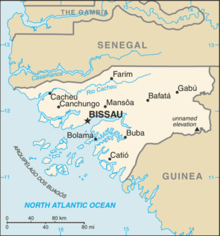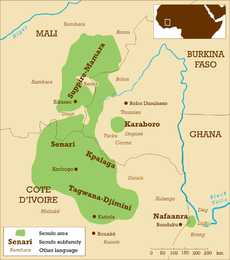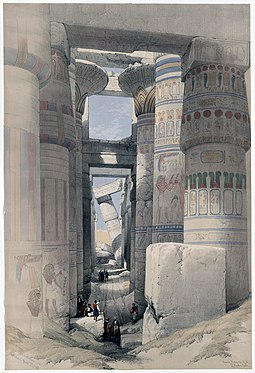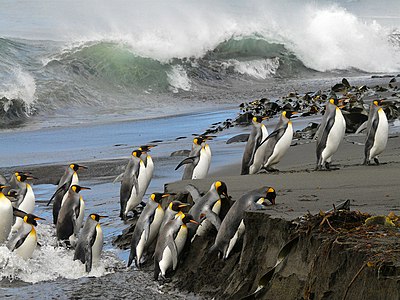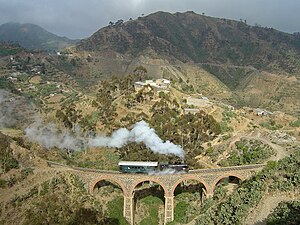Portal:Africa



Africa is the world's second-largest and second-most populous continent after Asia. At about 30.3 million km2 (11.7 million square miles) including adjacent islands, it covers 20% of Earth's land area and 6% of its total surface area. With 1.4 billion people0 as of 2021, it accounts for about 18% of the world's human population. Africa's population is the youngest amongst all the continents; the median age in 2012 was 19.7, when the worldwide median age was 30.4. Despite a wide range of natural resources, Africa is the least wealthy continent per capita and second-least wealthy by total wealth, ahead of Oceania. Scholars have attributed this to different factors including geography, climate, corruption, colonialism, the Cold War, and neocolonialism. Despite this low concentration of wealth, recent economic expansion and the large and young population make Africa an important economic market in the broader global context. Africa has a large quantity of natural resources and food resources, including diamonds, sugar, salt, gold, iron, cobalt, uranium, copper, bauxite, silver, petroleum, natural gas, cocoa beans, and.
Africa straddles the equator and the prime meridian. It is the only continent to stretch from the northern temperate to the southern temperate zones. The majority of the continent and its countries are in the Northern Hemisphere, with a substantial portion and a number of countries in the Southern Hemisphere. Most of the continent lies in the tropics, except for a large part of Western Sahara, Algeria, Libya and Egypt, the northern tip of Mauritania, and the entire territories of Morocco, Ceuta, Melilla, and Tunisia which in turn are located above the tropic of Cancer, in the northern temperate zone. In the other extreme of the continent, southern Namibia, southern Botswana, great parts of South Africa, the entire territories of Lesotho and Eswatini and the southern tips of Mozambique and Madagascar are located below the tropic of Capricorn, in the southern temperate zone.
Africa is highly biodiverse; it is the continent with the largest number of megafauna species, as it was least affected by the extinction of the Pleistocene megafauna. However, Africa also is heavily affected by a wide range of environmental issues, including desertification, deforestation, water scarcity, and pollution. These entrenched environmental concerns are expected to worsen as climate change impacts Africa. The UN Intergovernmental Panel on Climate Change has identified Africa as the continent most vulnerable to climate change.
The history of Africa is long, complex, and varied, and has often been under-appreciated by the global historical community. Africa, particularly Eastern Africa, is widely accepted to be the place of origin of humans and the Hominidae clade, also known as the great apes. The earliest hominids and their ancestors have been dated to around 7 million years ago, including Sahelanthropus, Australopithecus africanus, A. afarensis, Homo erectus, H. habilis and H. ergaster, the earliest Homo sapiens (modern human) remains, found in Ethiopia, South Africa, and Morocco, date to circa 233,000, 259,000, and 300,000 years ago, respectively, and Homo sapiens is believed to have originated in Africa around 350,000–260,000 years ago. Africa is also considered by anthropologists to be the most genetically diverse continent as a result of being the longest inhabited. (Full article...)
Selected article –
On 12 April 2012, a coup d'état in Guinea-Bissau was staged by elements of the armed forces about two weeks before the second round of a presidential election between Carlos Gomes Júnior and Kumba Ialá. The coup started in the evening with military personnel and equipment making its way onto the streets, followed by the state-owned media being taken off-air.
Both second-round candidates and the incumbent president were initially arrested by the junta. Members of the Military Council, which ran the country until an interim National Transitional Council was established on 15 April, said that one of the reasons for the coup was the incumbent civilian administration's call for Angolan help to reform the military. Following international condemnation and sanctions against leaders of the junta, an agreement was signed that led to the third place candidate in the election, Manuel Serifo Nhamadjo, being selected as interim president. The presidential election was aborted and postponed for at least two years into the future. An interim government was tasked with administering Guinea-Bissau in the meantime. (Full article...)Featured pictures –
Did you know (auto-generated) -

- ... that the South Australian Labor politician Ernest Roberts served two tours in South Africa during the Second Boer War?
- ... that Kobe and Vanessa Bryant were founding donors of the National Museum of African American History and Culture?
- ... that after anti-apartheid activist David Rabkin was sentenced to prison in South Africa, he gave the courtroom the clenched-fist black power salute?
- ... that Erick Russell is the first openly gay African American elected to a statewide office in the United States?
- ... that the Shady Rest Golf and Country Club was the home of John Shippen, the first African American to compete in the U.S. Open?
- ... that one of the first activities of The Coloured Women's Club of Montreal was to help veterans returning from the Second Boer War in South Africa?
Categories
Selected biography –

Sir Roland "Roy" Welensky KCMG PC JP (né Raphael Welensky; 20 January 1907 – 5 December 1991) was a Northern Rhodesian politician and the second and last Prime Minister of the Federation of Rhodesia and Nyasaland.
Born in Salisbury, Southern Rhodesia (now Harare, Zimbabwe) to an Afrikaner mother and a Lithuanian Jewish father, he moved to Northern Rhodesia, became involved with the trade unions, and entered the colonial legislative council in 1938. There, he campaigned for the amalgamation of Northern and Southern Rhodesia (the latter under white self-government, the former under the colonial office). Although unsuccessful, he succeeded in the formation of the Federation of Rhodesia and Nyasaland, a state within the British Empire that sought to retain predominant power for the white minority while moving in a progressive political direction, in contrast to South Africa under the apartheid system. (Full article...)Selected country –
 |

|
|

| ||
Côte d'Ivoire (officially the République de Côte d'Ivoire), formerly known as Ivory Coast, is a country in West Africa. It borders Liberia and Guinea to the west, Mali and Burkina Faso to the north, Ghana to the east, and the Gulf of Guinea to the south.
From independence in 1960 until 1993, it was led by Félix Houphouët-Boigny and was closely associated economically and politically with its West African neighbors and maintained close ties to the West, which helped its economic development and political stability. Following the end of Houphoët-Boigny's rule, this stability was destroyed by two coups (1999 and 2001) and the Ivorian Civil War.
Côte d'Ivoire is a republic with strong executive power personified in the President. Its de jure capital is Yamoussoukro and the official language is French. The economy is largely market-based and relies heavily on agriculture, with smallholder cash crop production being dominant. (Read more...)
Selected city –
Cairo (/ˈkaɪroʊ/ KY-roh; Arabic: القاهرة, romanized: al-Qāhirah, Egyptian Arabic pronunciation: [el.qɑ(ː)ˈheɾɑ] ) is the capital of Egypt and the city-state Cairo Governorate, and is the country's largest city, being home to more than 10 million people. It is also part of the largest urban agglomeration in Africa, the Arab world and the Middle East. The Greater Cairo metropolitan area is the 12th-largest in the world by population with over 22.1 million people.
Cairo is associated with ancient Egypt, as the Giza pyramid complex and the ancient cities of Memphis and Heliopolis are located in its geographical area. Located near the Nile Delta, the city first developed as Fustat following the Muslim conquest of Egypt in 641 next to an existing ancient Roman fortress, Babylon. Cairo was founded by the Fatimid dynasty in 969. It later superseded Fustat as the main urban centre during the Ayyubid and Mamluk periods (12th–16th centuries). Cairo has long been a centre of the region's political and cultural life, and is titled "the city of a thousand minarets" for its preponderance of Islamic architecture. Cairo's historic center was awarded World Heritage Site status in 1979. Cairo is considered a World City with a "Beta +" classification according to GaWC. (Full article...)In the news
- 12 February 2024 –
- Two boats collide on the Congo River near Kinshasa, Democratic Republic of the Congo; with the death toll remains unclear. (AP)
- 11 February 2024 – 2023 Africa Cup of Nations
- In association football, hosts Ivory Coast win their third Africa Cup of Nations by defeating Nigeria 2–1 in the final. Sébastien Haller scores the winning goal in the 81st minute. (The Guardian)
- 10 February 2024 – Somali civil war
- Four Emirati soldiers and a Bahraini military officer are killed, while ten other people are injured, when a soldier opens fire at a military base in Mogadishu, Somalia, before being killed in the ensuing shootout. Al-Shabaab claims responsibility. (AP)
- 10 February 2024 –
- A Eurocopter EC130 helicopter crashes near Nipton, California, United States, killing all the six people on board, including Nigerian banker Herbert Wigwe. (CBS News)
- 10 February 2024 – 2023–2024 Senegalese protests
- Violent protests occur in Senegal following an announcement by President Macky Sall that presidential elections have been delayed from February 25 to December 15. (Sky News)
- 9 February 2024 –
- At least 18 people are killed during a collision between a bus and a truck on a road in Kinshasa, Democratic Republic of the Congo. (AP)
Updated: 16:33, 14 February 2024
General images -
Africa topics
More did you know –
- ...that Rukwanzi Island, an island in Lake Albert, one of the African Great Lakes, is the subject of a territorial dispute between the Democratic Republic of the Congo and Uganda?
- ...that Oumarou Sidikou, vice-governor of the Central Bank of West African States from 1988 to 1993, was a minister in the government of Nigerien Prime Minister Hama Amadou, which was ousted by a military coup in 1996?
- ...that Jason Dunford, an All-Africa Games gold medalist and runner-up for the 2006 Kenyan Sportsman of the Year award, has a younger brother who was selected "most promising sportsman" at the same awards?
- ...that Sam Mbakwe, governor of Imo State from 1979 to 1983, served in the army of the Republic of Biafra, an Igbo secessionist state in southeastern Nigeria, during the Nigerian Civil War?
Related portals
Major Religions in Africa
North Africa
West Africa
Central Africa
East Africa
Southern Africa
Associated Wikimedia
The following Wikimedia Foundation sister projects provide more on this subject:
-
Commons
Free media repository -
Wikibooks
Free textbooks and manuals -
Wikidata
Free knowledge base -
Wikinews
Free-content news -
Wikiquote
Collection of quotations -
Wikisource
Free-content library -
Wikispecies
Directory of species -
Wikiversity
Free learning tools -
Wikivoyage
Free travel guide -
Wiktionary
Dictionary and thesaurus

